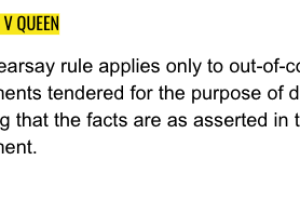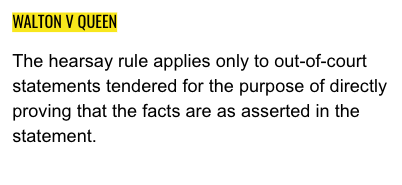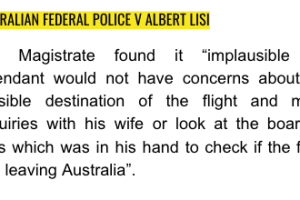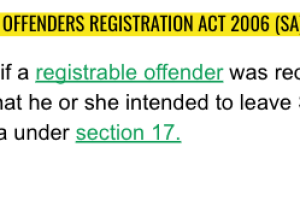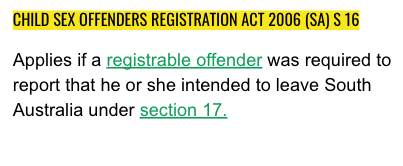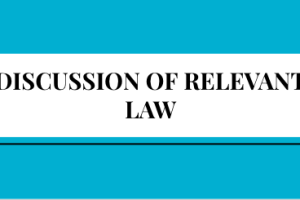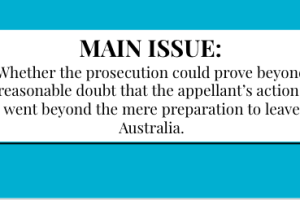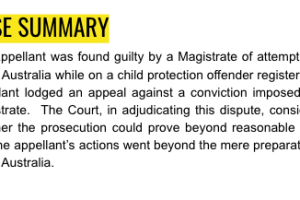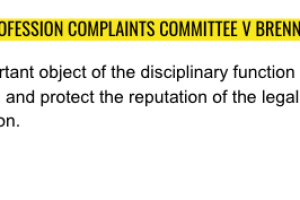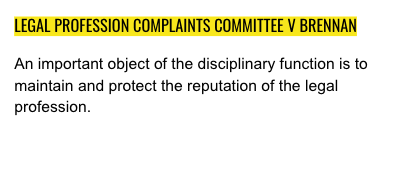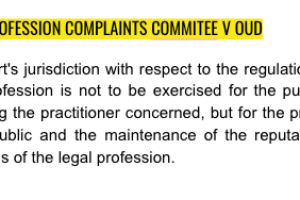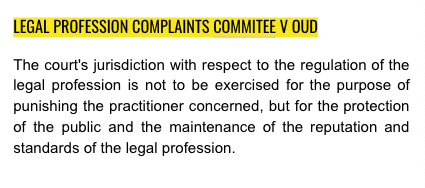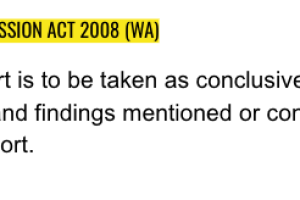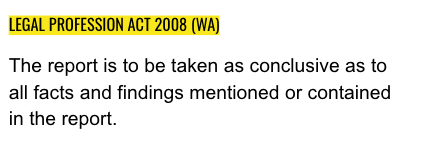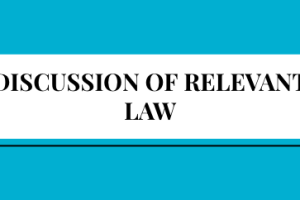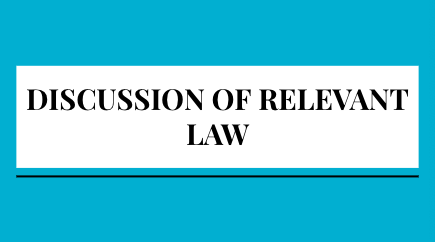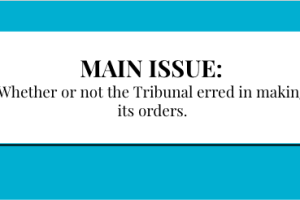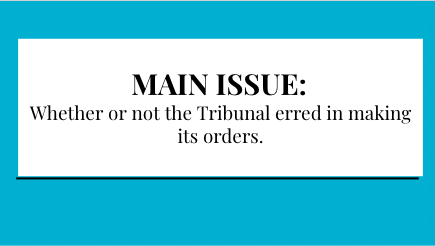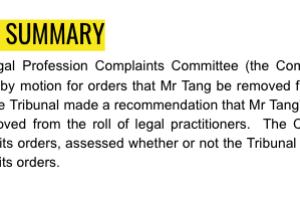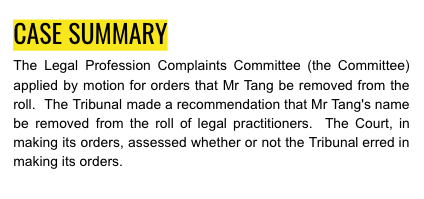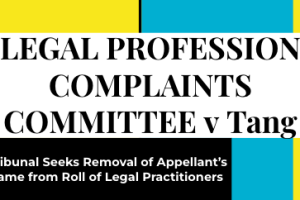Child Offender Charged for Attempting to Leave Australia

LISI v AUSTRALIAN FEDERAL POLICE [2022] SASC 56 (9 June 2022)
The appellant was found guilty by a Magistrate of attempting to leave Australia while on a child protection offender register. The appellant lodged an appeal against a conviction imposed by a Magistrate. The Court, in adjudicating this dispute, considered whether the prosecution could prove beyond reasonable doubt that the appellant’s actions went beyond the mere preparation to leave Australia.


Facts:
Albert Lisi (the Defendant) is an Australian Citizen. The Defendant became an Australian citizen on 22 May 2012. The Defendant has an Australian passport. On 10 May 2016 the Defendant was convicted of an offence that is listed as a Class 2 offence in Schedule 1 of the Child Sex Offenders Registration Act 2006 (SA).
The Defendant became a registrable offender on the Australian National Child Offender Register (ANCOR) and subject to reporting obligations for 8 years, commencing 10 May 2016. The Defendant was allocated identifying number 0052246. Since 13 December 2017 it has been an offence for certain registered offenders to travel overseas, unless a competent authority has given permission for the person to leave Australia or the person’s reporting obligations are suspended, pursuant to s 271A.1 of the Criminal Code (Cth).
On 15 November 2021, the appellant was found guilty by a Magistrate of attempting to leave Australia while on a child protection offender register, contrary to s 11.1(1) and 271A.1(1) of the Criminal Code (Cth). The offence occurred on 26 July 2019, when the appellant and his wife attended Adelaide Airport where they were booked to travel on Jetstar airline international flight JQ125 to Denpasar, Bali. The appellant and his wife were intercepted prior to boarding the flight by the Australian Federal Police ('AFP'). The appellant had not been granted permission to leave Australia by the ANCOR Registrar at SAPOL, nor any other Competent Authority under s 12 of the Australian Passport Act 2005 (Cth).
The appellant pleaded not guilty to the charged offence. The appellant gave evidence at trial that he only became aware for the first time that his wife had purchased the tickets in his name to fly to Bali when the AFP approached him at the international departure gate. It was the appellant’s position at trial that the prosecution could not prove beyond reasonable doubt that the appellant’s actions went beyond the mere preparation to leave Australia and further, that the prosecution could not prove that he had intended to leave Australia.

Issue:
Whether or not the prosecution could prove beyond reasonable doubt that the appellant’s actions went beyond the mere preparation to leave Australia.

Applicable law:
Child Sex Offenders Registration Act 2006 (SA) s 19 - applies if a registrable offender was required to report that he or she intended to leave South Australia under section 17.

Australian Federal Police v Albert Lisi (Magistrates Court of South Australia, Magistrate Smolicz, 15 November 2021) - where the Magistrate found it “implausible the defendant would not have concerns about the possible destination of the flight and make enquiries with his wife or look at the boarding pass which was in his hand to check if the flight was leaving Australia”.

Walton v The Queen [1989] HCA 9; (1989) 166 CLR 283 - provides that the hearsay rule applies only to out-of-court statements tendered for the purpose of directly proving that the facts are as asserted in the statement.

Walton v The Queen [1989] HCA 9; (1989) 166 CLR 283 at 289 - provides that the making of the statement has independent evidentiary value in proving the author’s intentions, those intentions being a fact in issue or a fact relevant to a fact in issue.
Ratten v The Queen [1971] UKPC 23; [1972] AC 378 - provides that it is the making of the statement proximately to the events in issue which ensures reliability. How proximately the statement was made can be determined by enquiring whether the proximity sufficiently precludes the risk of concoction.
Warren v Coombes [1979] HCA 9; (1979) 142 CLR 531 - provides that in general an appellate court is in as good a position as the trial judge to decide on the proper inference to be drawn from facts which are undisputed or which, having been disputed, are established by the findings of the trial judge.
Analysis:
The task of this Court is to reach its own view of the facts by making an independent review of the evidence. As it is a rehearing, the Court has an obligation to rehear the case in the sense that it must conduct an independent review of all of the evidence that was before the Magistrate.
It is the duty of this Court to make up its own mind, after giving due weight to the Magistrate’s advantage in seeing and hearing the witnesses, and of course, after giving weight to any findings on credibility. This was a circumstantial case in which it is the combined weight of the evidence that needs to be considered, not the individual pieces.
It was submitted that the appellant had previously travelled overseas, having sought and obtained permission and, for practical purposes, nothing had changed in terms of the need to obtain approval. Put simply the submission was that if he had gained approval in the past, why not do the same again if he knew that the plan was to travel overseas.
It is apparent from that document that there had been a change in relation to overseas travel requirements. From 13 December 2017, approval was required if there were “exceptional circumstances” that warranted travel.
Contrary to what was put by counsel for the appellant, the new requirements had made it more difficult for someone on the ANCOR register to travel. It is apparent from the evidence that the appellant believed that the requirements for travelling overseas had become more onerous since 13 December 2017. Contrary to the submission put by counsel for the appellant, that would suggest that there was some motive for the appellant to take the risk of attempting to travel overseas without first obtaining the requisite permission.
Conclusion:
The appellant’s conviction is not against the weight of the evidence. There was a strong body of circumstantial evidence that pointed towards the guilt of the appellant.
#Appeals #Evidence

